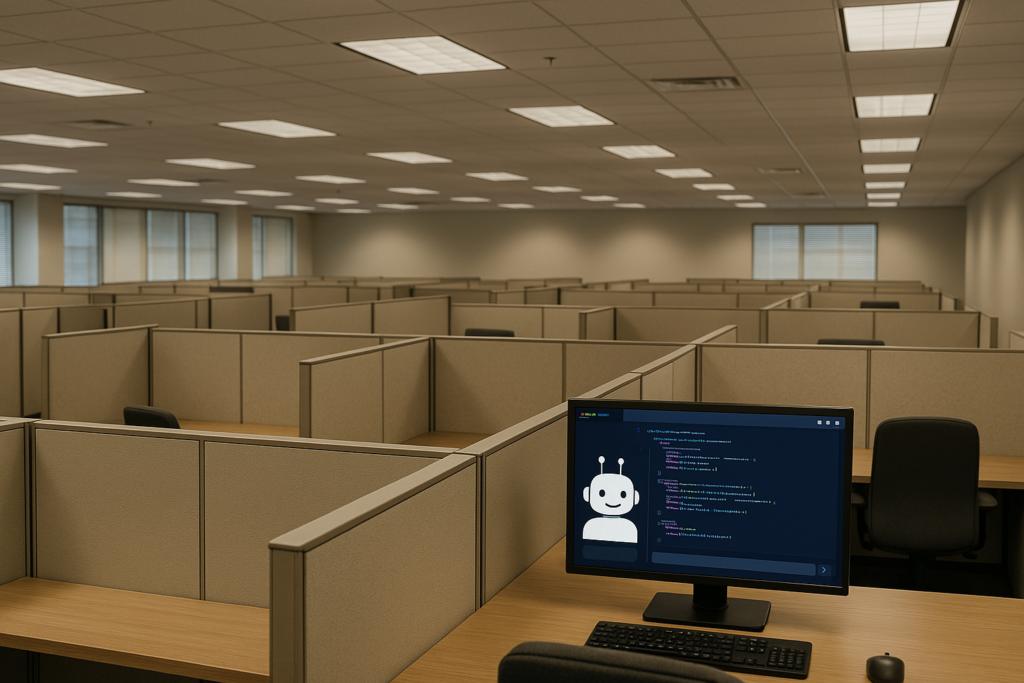In Short:
- AI is enhancing productivity and efficiency across industries, especially tech.
- This shift has disrupted traditional hiring models, particularly for entry-level software engineers.
- Job losses are increasing among fresh engineering graduates, especially in India.
- The promise of the demographic dividend is being threatened by rising unemployment.
- The business model of IT companies is shifting from linear hiring to leaner, AI-assisted teams.
- Urgent need for curriculum reform, government intervention, and policy support.
- Importance of lifelong learning, reskilling, and alternative career pathways.
A Tectonic Shift in the Tech Industry
Artificial Intelligence (AI) is redefining how businesses operate. From automating mundane tasks to driving strategic decision-making, AI has transitioned from being a buzzword to becoming a backbone of modern productivity. While this revolution is fueling unparalleled efficiency and innovation, it is also bringing unintended consequences—especially for fresh software engineering graduates. In India, where millions of students graduate from engineering colleges every year, AI-led disruption has caused an employment crisis that threatens the very foundation of the country’s demographic dividend.
Understanding AI-Led Productivity: The Promise and the Price
AI tools like ChatGPT, GitHub Copilot, and automated DevOps solutions are enabling developers to write code faster, find bugs quicker, and deploy at scale with minimal human intervention. Businesses are leveraging these tools to do more with fewer people, leading to higher profit margins and faster product delivery. However, the dark side of this productivity surge is the shrinking need for entry-level talent.
Case in Point: Infosys, Wipro, and TCS have slowed down or even frozen hiring for junior developers. Startups, once the absorbers of surplus engineering talent, are increasingly automating core tech functions.
The Crushed Dreams of Young Engineers

For many Indian families, a software engineering job is a ticket to middle-class stability. But today’s graduates face dwindling campus placements, deferred offer letters, and rescinded job offers.
The Numbers:
- In 2023-24, only 30% of graduates from Tier 2 and Tier 3 colleges received campus placement offers.
- Layoffs and hiring freezes have increased significantly in IT services.
Voices from the Ground:
- “I graduated from a reputable college with good grades, but my offer from a mid-tier IT firm was never honored,” says Ayush, a BTech graduate from Uttar Pradesh.
- “Even internships are now AI-filtered, and competition is global,” says Radhika, a final-year student in Hyderabad.
A Broken Business Model: From Headcount to Hyper-Efficiency
India’s IT services industry has traditionally thrived on a linear model—more projects meant more hires. AI breaks this model. Now, the same project that earlier required 10 junior coders can be managed by 2 senior engineers and AI-powered tools.
Result:
- Collapse of bulk hiring.
- Preference for experienced, AI-augmented professionals.
- Outsourcing to smaller global teams with AI integration.
The Macro View: India’s Demographic Dividend at Risk
India’s strength lies in its youth. But unemployment among the educated youth is growing.
World Bank Report (2023): Youth unemployment in India has crossed 23%.
If millions of educated graduates can’t find jobs, the economic dividend could turn into a demographic disaster.
Additional Impacts:
- Increase in brain drain.
- Rise in mental health issues among unemployed graduates.
- Economic dependency on fewer earners per household.
The Role of Academia: Still Teaching Yesterday’s Skills
The curriculum in many Indian engineering colleges is outdated. AI, machine learning, data science, and ethical hacking are either optional or entirely absent.
Needed Changes:
- Integrate real-world AI tools into the syllabus.
- Promote internships that focus on applied tech.
- Encourage interdisciplinary courses (e.g., AI + economics, or AI + ethics).
What Can Be Done? Policy and Private Sector Response
Government:
- Subsidize AI and tech training programs for fresh graduates.
- Offer incentives to companies hiring and training entry-level talent.
- Fund research centers in Tier 2/3 cities.
Private Sector:
- Launch mentorship and apprenticeship models.
- Collaborate with ed-tech platforms for upskilling.
- Shift hiring focus from degrees to skills.
Academia:
- Partner with industries to design modular, up-to-date courses.
- Encourage innovation labs and hackathons.
Lifelong Learning and Reskilling: A Personal Roadmap for Engineers
Given the shift, every engineer must now:
- Learn to learn continuously.
- Build a portfolio with open-source contributions.
- Develop soft skills: communication, critical thinking, and adaptability.
- Embrace cross-functional roles (product, business, design).
Suggested Tools & Platforms:
- Coursera, edX, NPTEL for structured learning.
- Kaggle and GitHub for practical exposure.
- LinkedIn for networking and job visibility.
Alternative Career Paths: More Than Just Coding
All is not lost. AI is creating new job roles:
- AI Trainer / Data Annotator
- Prompt Engineer
- Product Manager with AI focus
- Cybersecurity Analyst
- Policy Analyst in AI Governance
These roles may not require deep coding skills but do demand tech fluency.
Conclusion: Balancing the Scales Between Progress and People
AI is here to stay, and its contribution to business productivity is undeniable. But its rapid integration without corresponding human-centric policies and educational reforms is leading to social and economic distress. India must act now to turn this challenge into an opportunity.
By reshaping education, encouraging lifelong learning, and adopting inclusive policies, we can ensure that young software engineers are not victims but beneficiaries of the AI revolution.









+ There are no comments
Add yours